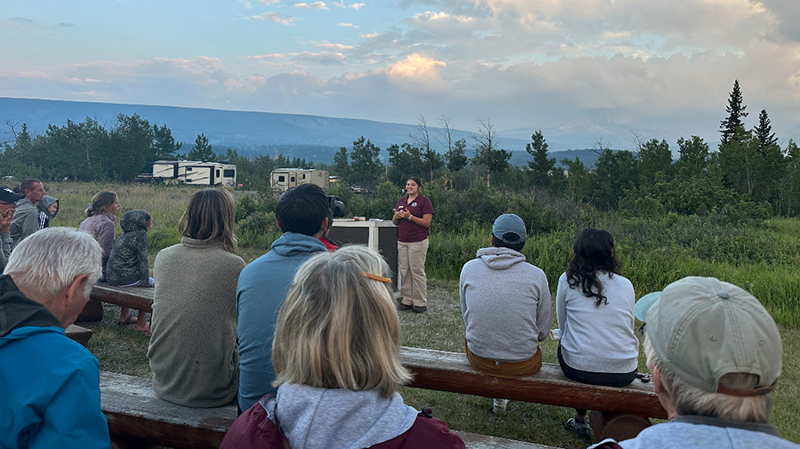
By Ronica Stromberg
Madison Martinez interned at Glacier National Park this past summer, experiencing work as a park ranger and confirming her decision to one day wear the green and gray.
"It was a really great experience," said the senior in the College of Agriculture and School of Natural Resources. "I was able to learn a lot about myself and learn a lot about what my future could potentially look like. It was really weird knowing that if I came back, this is what my future would be. I don't think a lot of people get a taste of what their future could be and actually being able to experience it and understand it before it's yours."
Martinez said she did not grow up going to national parks or spending time outdoors but became interested in related work through watching documentaries and YouTube videos. She said the screentime and prior work at a wildlife refuge didn’t fully prepare her for what awaited her upon arriving at Glacier National Park on May 21.
"I just didn't understand how hectic and how busy and what goes into national parks," she said. "If I had grown up going to national parks, I would know that they're really busy, but I just wasn't prepared for that."
In her two-week training at the park, she learned she would soon be presenting to and fielding questions from visitors totaling almost 3 million a year. She quickly researched and soaked in all she could about the park, glaciers and the animals living there.
The American Conservation Experience sponsoring her internship had also given her and 20 other interns a week’s training through the National Park Service Academy. The academy has a competitive admission and is designed to introduce diverse 18- to 30-year-olds to careers with the National Park Service. At it, the interns learned how to interpret science for the public and handle difficult situations. After these trainings, Martinez received short times during workdays to further research topics.
For her evening programs, she created a 45-minute talk, “The Power of Perception." In it, she told how the senses of grizzly bears, bats, ptarmigans and fire-chasing beetles surpass human senses. Like, bears can smell 2,100 times better than humans up to 20 miles away. Fire-chasing beetles, which mate in charred rubble, can sense fire up to 80 miles away.
Martinez also created 10- to 15-minute talks about glaciers and gave those at the Jackson Glacier Overlook. Visitors came and went as she gave the same talk over and over, interspersed with answering questions. She became an expert at defining glaciers by reeling off, "Glaciers are 25 acres, 100 feet deep and moving under the weight of themselves."
Read the complete story at https://snr.unl.edu/aboutus/what/newstory.aspx?fid=1186